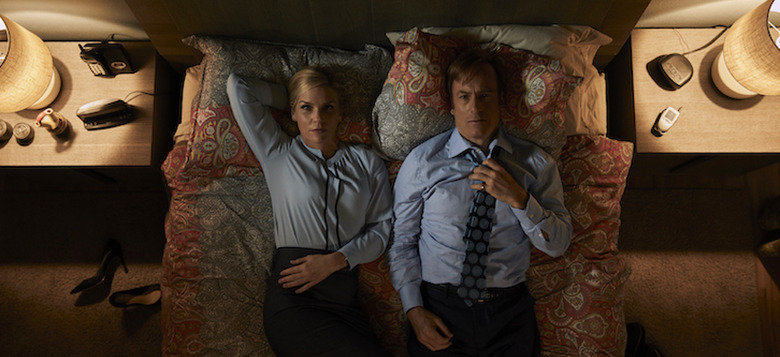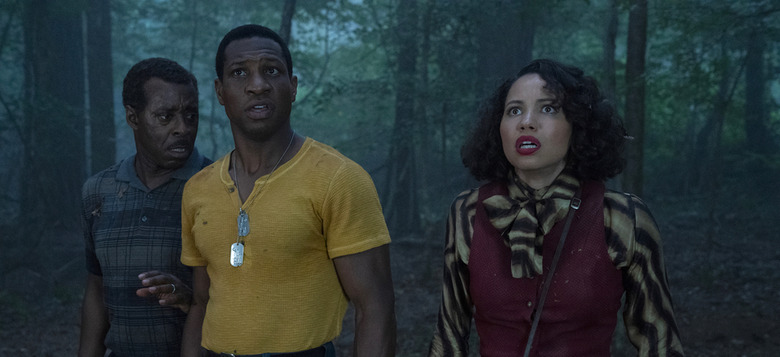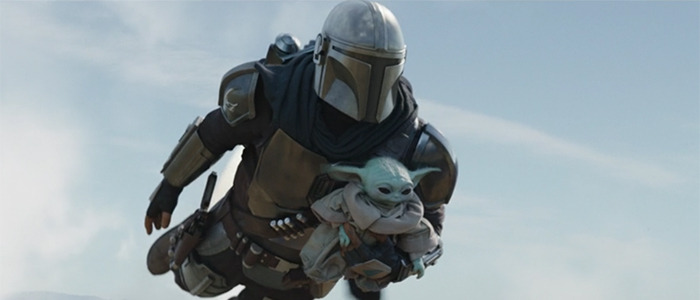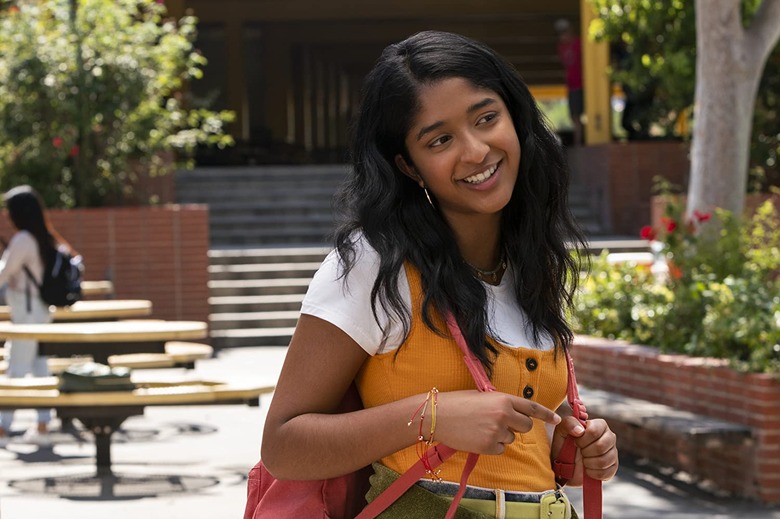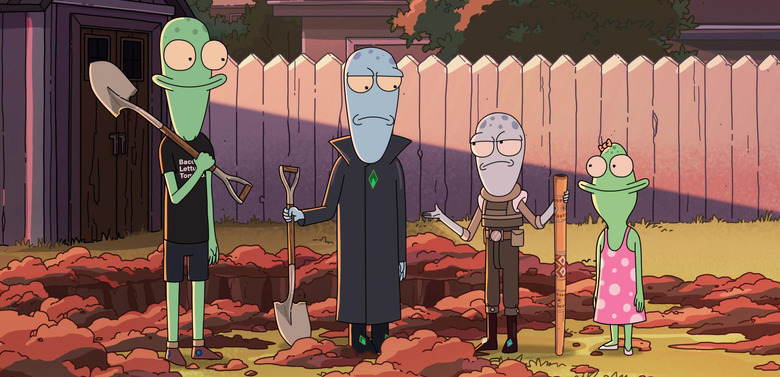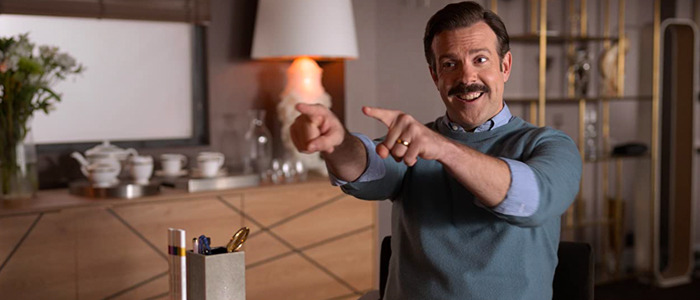Bounty Hunters, Sad Lawyers, And Football Coaches: Our Favorite Television Of 2020
Look, you're not going to find a human being on this planet who doesn't want to close the book on 2020. But in that sea of darkness and abject misery, there are silver linings to be found. Silver linings like...well, the television was pretty damn good.
Join us, the /Film staff, as we run down the best TV we watched in 2020.
Better Call Saul
In its penultimate season, Better Call Saul continued to remind us it's the best show on TV right now. We're well beyond the point where this seemed like a bad idea – "A Breaking Bad prequel focused on the comic relief lawyer character?! Who needs that?!" – and as the show draws towards its sixth and final season, the tension is almost unbearable.
That in itself is a feat – after all, we know where this story is going. Sort of. We know that Jimmy McGill, aka Saul Goodman (Bob Odenkirk), becomes the sleazy lawyer of Walter White. But Better Call Saul has built itself a completely new world. Yes, characters from Breaking Bad show up. But even if you've never seen a single frame of Breaking Bad, you're fully invested in this story of conman turned lawyer turned lawyer-conman Jimmy as he loses whatever soul he had left, and brings the people around him down in the process.
With season 5, all eyes are once again on Jimmy's girlfriend/confidant Kim Wexler, played by Rhea Seehorn – who continues to give the best performance on television even though the Emmys keep overlooking her. When the show began, Kim was like Jimmy's conscience – the person there to keep him grounded and remind him of a little thing called ethics. As season 5 ended, Kim was hatching a dark and potentially disastrous plot against her old boss in such a way that it even left the morally compromised Jimmy shocked and alarmed. One thing is for sure: however Better Call Saul ends it won't be pretty, but it will be brilliant. (Chris Evangelista)
Lovecraft Country
Sometimes, a television show arrives at just the right time. As a lavish genre spectacle made with HBO money that has names like J.J. Abrams and Jordan Peele in the credits, Lovecraft Country was always going to grab eyeballs. But in 2020, a year that saw the United States once again forced to publicly and loudly grapple with its legacy of racism and white supremacy, it didn't just grab those eyeballs. It gouged them. Rather appropriate for a horror show full of warlocks and monsters and ghosts and mad men.
With showrunner Misha Green at the helm, Lovecraft Country adopts a "not a boring moment allowed, thank you very much" approach to storytelling from episode one, devouring story like a hungry shoggoth eating a racist backwoods sheriff. The series operates at a sprint, so full of wild ideas and so fueled by wicked dark humor and righteous anger that to slow down for even a moment would be a sin. The end of episode 2 would've been the season finale of another show. Green and her collaborators aren't here to mess around. They're here to show you how often "prestige" television shows are just wasting your time.
This style means Lovecraft Country is always fun, always interesting, and occasionally a little uneven as it bites off more than it can chew. But that blend of genre fiction and social commentary connects more often than it doesn't, leading to powerful, infuriating, shocking, incredible moments that remain branded upon the brain: a Black family pursued by supernatural creatures and racist cops through the same dark woods; a home rented by Black tenants haunted by a white supremacist ghost; a Black woman unstuck in time and space, finally realizing the potential society has denied her by living different existences across the expanse of the cosmos. Oh, and an unforgettable detour to Korea, where the horrors of war collide with local mythology that is all-too-real.
The horror elements are as inventive and addictive as any other genre show. Taken as a horror series (and as a science fiction series and a fantasy series), it's a hoot. It's a blast. But the pain of the characters surviving these outrageous events – the fact that that they can escape a warlock conspiracy or spelunk through a magical temple but still get harassed by cops because of the color of their skin – pervades every frame. Another show may already have the title, but this is the real American horror story...and Lovecraft Country is here to re-claim American genre fiction for those who have been kept on the sidelines for too long. (Jacob Hall)
The Mandalorian
It's remarkable how much better The Mandalorian became in its second season. The first season felt like a good proof of concept, successfully capturing the feeling of the original Star Wars trilogy while introducing the world to the cuteness that is Baby Yoda. But something about the old school television western mission-of-the-week format left me wanting more. Thankfully, season 2 delivered that in spades as the storylines intensified and interweaved in a masterful crescendo.
As the show became more serialized, albeit, while still leaning on the "video game fetch quest of the week" structure, it ramped up the action and personal stakes. And let's talk about that action. The addition of Sam Hargrave (the stunt supervisor/second unit director on films like Atomic Blonde and Deadpool 2 and the director of Extraction) has amplified what's possible, really making this series a cinematic experience. The addition of filmmakers like Peyton Reed, Jon Favreau (finally stepping behind the camera of the series he created) and Robert Rodriguez (delivering the best thing he's directed in a long time) to the line-up gave the show a new energy.
The season introduced some fan favorite characters from Dave Filoni's animated series to live action, and often walks the very fine line of fan service, rarely, if ever, stepping over the edge. In a year that sucked as much as 2020, there was nothing that got me as excited week after week than The Mandalorian. In the season finale alone, I was jumping up and down with giddiness one moment and crying the next. Season 1 of The Mandalorian proved that they could make live action Star Wars on the small screen with groundbreaking technology, while season 2 proved that it could be just as essential and moving as the big screen entries. (Peter Sciretta)
Never Have I Ever
The romantic-comedy becomes a Trojan horse for a disarmingly affecting exploration of grief in Never Have I Ever, a teen coming-of-age comedy that is easily the culmination of Mindy Kaling's career. Kaling is secretly one of the best rom-com writers working today, in part due to her unabashed love for the genre, but her brand of comedy is admittedly not for everyone. I was one of the few who stuck through the wildly uneven The Mindy Project, which starred Kaling as a more obnoxious version of herself — a bit of a disconcerting personality for a character who was supposed to be a doctor.
But all of Kaling's hallmarks in her writing — an immature, self-destructive character, spiky humor, and an ensemble who are all just really, really horny — all falls into place with Never Have I Ever. Of course the character is immature and selfish, she's a teen! Of course everyone is unbelievably sad and horny, they're teens! It's as if Kaling found the secret recipe she's been looking for, and it all clicked in place; and all she had to do was look back into her own childhood.
Never Have I Ever is loosely based on Kaling's own experiences growing up in a Massachusetts suburb, which lends to its sensitive snapshot of the immigrant experience, centered around the cocky 15-year-old Devi Vishwakumar (a delightful Maitreyi Ramakrishnan in a star-making turn). But the series only uses that premise as a launching ground for its startlingly real exploration of grief, as Devi attempts to recover from her father's death by chasing after the hottest boy in school. It's Fleabag for teens, and the show's slow unveiling of its sad heart at the center of its bright, offbeat comedy is shattering. Kaling deftly juggles the heartbreaking family drama with the lighthearted, swooning romance, which made for some of the finest TV this year. (Hoai-Tran Bui)
Solar Opposites
From the mind of Rick and Morty creator Justin Roiland and series writer Mike McMahan comes another insane, hilarious animated sci-fi comedy series that puts a twisted spin on the classic family sitcom. Solar Opposites arrived on Hulu all the way back in May this year, delivering one of the funniest shows of the year with a comedic edge that's a little more deranged than Rick and Morty, but also somehow less sinister and more innocent.
Solar Opposites follows a team of four aliens who were forced to evacuate their home world Shlorp and sent to find a new planet inhabit. Korvo (Justin Roiland) is mostly focused on the mission and repairing the ship they crashed into the roof of their new suburban home, though he frequently gets distracted by the antics of the pop culture obsessed Terry (Thomas Middleditch). Then there's the young replicants Yumyulack (Sean Giambrone) and Jesse (Mary Mack), who are dealing with teenage life on Earth. They all get into a variety of mishaps with various alien creatures, space weaponry, and Earth's residents, and even though they've already been on the planet for an entire year, they still don't quite have the hang of everything yet.
Most of the time, the series is putting a madcap spin on sitcom episode formulas with some raunchy humor and gnarly sci-fi violence mixing things up, and it delivers raucous laughter in droves. But where Solar Opposites really succeeds is in an additional subplot involving a shrunken down sect of humans who are being kept in a multi-level hamster habitat in the replicants' bedroom wall. A larger story gradually unfolds among the post-apocalyptic human society within, and the payoff is nothing short of spectacular, taking Solar Opposites to another level and making it so much more than your average animated sitcom.
If you'd like to read more about the first season of Solar Opposites, read my full review right here. Otherwise, buckle up, because Hulu has already ordered two more seasons of the series, and we can't wait to see what happens next. (Ethan Anderton)
Ted Lasso
It would be totally understandable if you saw a trailer for Ted Lasso and thought, "Nah, that's probably going to suck." A trailer may be able to relay a few out of context jokes, but it can't capture the best thing about this particular series: its inherent warmth. Here's a show with a high concept premise – an American football coach gets hired to coach and English football team, despite not even knowing the rules of English football – that uses that premise as a Trojan horse to smuggle in great characters, satisfying arcs, surprising relationships, and yes, plenty of great jokes.
We've written about this show a lot already, so I won't rehash what's been said before. Instead, I want to briefly describe the moment it fully wriggled its way into my heart and won me over for good. About halfway through the second episode, the folksy, "gee whiz" Ted enters the team owner's office and has a quick conversation with her and Higgins, the club's director of football operations. As Ted leaves the room, the normally straight-laced Higgins makes a pun ("Caesar you later," since they're both scheduled to eat salads together that afternoon), which reveals that Ted's loosey-goosey, personality-driven approach is slowly starting to permeate the club's staid culture. Upon hearing that pun, Ted bursts back in through the door, far faster and harder than any human should ever enter a room, only to simply point at Higgins, nod his head, and say the word "yes" before immediately leaving again.
The whole moment is over in 10 seconds, but it's a wonderful encapsulation of the show as a whole: it shows Ted's earnest charm and can-do sense of optimism, it incorporates some of the supporting actors (who are all terrific in the show) and starts to subvert their character archetypes, and it's also a way to let Jason Sudeikis do a big, unexpected, physical gag which shows why he's the only actor on Earth who could have successfully played this role as written. If you haven't seen Ted Lasso yet, let this be the thing that finally pushes you to check it out. (Ben Pearson)

